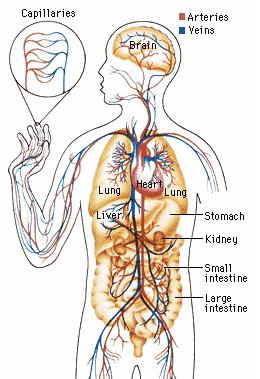Symptoms of stroke depend on the areas of the brain affected. The most common symptoms include sudden weakness, loss of sensation on one side of the body, partial loss of vision, dizziness, slurred speech, mental confusion, and personality changes. Symptoms commonly worsen over the next several hours or days. In some patients, the progression of symptoms leads to coma and death. In some minor strokes, symptoms disappear in less than a day. Such transient ischemic attacks (TIA's) often precede more serious strokes.
Causes. The majority of strokes are caused by blockage of blood circulation to the brain. Such blockage may result from either cerebral thrombosis or cerebral embolism. Cerebral thrombosis occurs when a blood clot forms in one of the major blood vessels supplying the brain. It is most often associated with atherosclerosis (hardening of the arteries) in the brain or the neck. Factors that increase the risk of cerebral thrombosis from atherosclerosis include hypertension (high blood pressure), diabetes, high blood levels of cholesterol, and cigarette smoking. Cerebral embolism involves a clot that forms in another part of the body, usually the heart or a major artery. The clot is then carried in the bloodstream until it lodges in a blood vessel that supplies the brain. Cerebral embolism is common in patients with heart disease and atherosclerosis of the large arteries.
Another major cause of strokes is cerebral hemorrhage, bleeding into the brain from a ruptured blood vessel. Cerebral hemorrhage can be caused by hypertension, malformations of the brain's arteries and veins, or especially in elderly people, disease of brain arteries. Strokes also may result from bleeding into the cerebrospinal fluid. This bleeding is called subarachnoid hemorrhage. It often results from a cerebral aneurysm, a defect in the wall of a blood vessel in the brain.
|


